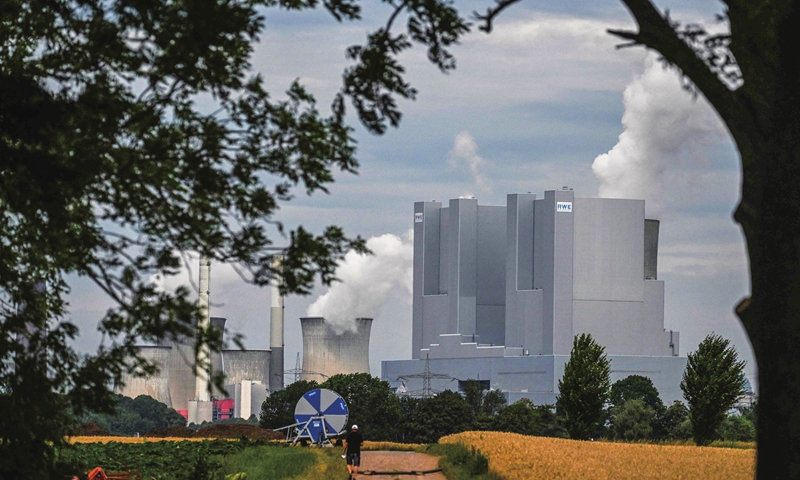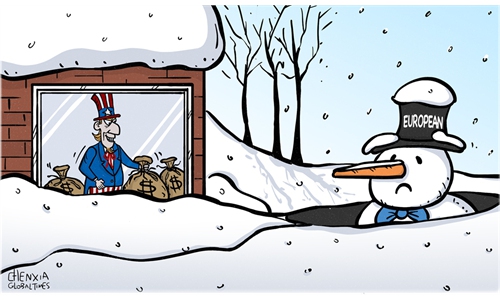EU's solidarity put to the test as most challenging winter looms amid energy crisis
Heavy dependency on US on energy, critical infrastructure poses great risks to EU's future security: experts

A coal-fired power plant operated by German energy supplier RWE is seen in Neurath, western Germany, on July 13, 2022. In response to a squeeze of Russian gas supplies, Germany has reactivated mothballed coal power plants to take the burden off gas. Photo: cnsphoto
As Europe's energy crisis escalates, leaders from major European countries failed to reach a consensus in the latest gathering on how to handle the soaring prices that will not only make this winter much colder but also heavily add to the continent's economic woes, dragging some into deep recession and possible political turmoil. With some European countries preparing for the worst-case scenarios for power supply shortage, leading EU members like Germany that seek alternative suppliers and roll out financial support are being criticized by others, putting the bloc's solidarity to the test.
Some European countries have been striving to walk a fine line as the EU agreed on a new sanction package against Russia. The previous EU sanctions on Russian energy have already caused economic pains for the continent. Most recently, the damage to the Nord Stream pipelines also delivered a heavy blow to Russia-Europe energy ties. However, some observers believe whoever stands to benefit from the incident was behind it.
European leaders failed to reach any agreement on Friday during an informal summit in Prague on how to cut gas prices that have been soaring in recent months and to address the energy crisis plaguing families and business in the bloc, according to media reports. Countries like Italy were frustrated against wealthier EU members such as Germany, which have announced big spending plans at home to ease the impact from soaring prices. Heavily indebted countries share concerns that wealthier countries "will gain an unfair edge by supporting their business and consumers," the Wall Street Journal said.
EU countries are fast falling behind their traditional fault lines: north versus south, richer versus poorer, said the New York Times.
Without the agreement reached on the gas price gaps at Prague meeting, the EU leaders are expected to meet on October 20 and 21 in Brussels to come back on the issue. Considering the deep divisions and differences, the prospect of achieving a positive outcome appeared not to be promising, experts said.
"European countries have different energy structure with different level of dependency on energy imports. For example, some Baltic countries like Poland already found out the alternative to Russian energy," Cui Hongjian, director of the Department of European Studies at the China Institute of International Studies, told the Global Times on Saturday.
Countries with higher debts are unable to roll out huge financial packages like Germany did to support consumers and business, and also, they hold different attitude toward the Russia-Ukraine crisis, Cui noted. "Some are much determined to use the energy as a tool to sanction Russia, but some have weaker political will to continue pressuring Moscow."
Different interests and attitudes across the European countries made it extremely difficult to reach a unified stance, which is becoming a major test for the EU on whether it can play out its role otherwise more suspicions about European integration will reappear, some expert said. They also believe that the upcoming winter will be the most challenging one for Europe, as the energy crisis - closely related to every aspect of people's livelihood, business and production - could trigger bigger economic and social problems with a political crisis looming.
Reliable partners?
German Chancellor Olaf Scholz pushed EU leaders on Friday to work with buyers in Asia and suppliers such as the US and Norway to find a sustainable, longer-term method to drive down prices, the WSJ said, citing German officials.
Just days ago, Germany's economic minister Robert Habeck was quoted in German media accusing the US and other so-called friendly gas supplier states of "astronomical prices" for their supplies, calling for more solidarity from the US in assisting its European allies that have been struggling in energy shortage.
"The energy supply is composed of a long-term and structural dependency, whether the US is a reliable supplier remains a question and how could its gas be shipped and stored in different places in the continent when some ports and infrastructure need to be renovated," Wang Yiwei, director of the Institute of International Affairs at the Renmin University of China, told the Global Times on Saturday.
Before Russia began the special military operation in Ukraine in February, Germany relied on Russia for 55 percent of its gas supplies, CBS News reported in September. In August, however, that proportion fell to 9.5 percent, the media report said, citing a spokeswoman for the Federal Ministry of Economics. And the Russian gas will not be fully replaced until at least 2024.
"Germany is now in a dilemma, and in terms of political correctness, it must be on the front line of sanctions against Russia but it is the biggest victim of those economic sanctions," Sun Keqin, a research fellow at the China Institutes of Contemporary International Relations, told the Global Times on Saturday.
Probably it could reach certain agreement with the US and Norway in terms of the energy prices, but it is almost impossible to completely replace Russian energy considering its high percentage of gas supplies from Russia, Sun said.
The recent Nord Stream leaks are widely considered as a heavy blow to some European countries like Germany that are heading into a cold winter in the throes of an energy crisis. The leaks also caused more turbulences in global energy prices. As the investigation goes on, some observers believe that the "black hands" behind the incident are likely those who could pocket benefits from it.
A crime scene investigation of the Nord Stream 1 and 2 gas pipelines from Russia to Europe found evidence of detonations, strengthening suspicions of "gross sabotage," Reuters reported on Thursday, citing Sweden's Security Service.
Reuters also reported on Friday that a US Navy reconnaissance aircraft flew near the site of the ruptured Nord Stream 2 pipeline in the Baltic Sea hours after the first damage emerged. But Washington said the flight was routine.
"Who is behind Nord Stream Sabotage? Who is the biggest beneficiary of Nord Stream Sabotage?" Chinese Foreign Ministry spokesperson Hua Chunying said in a latest Tweet, posting a screenshot of a media report saying that "Washington can now step in as Europe's top supplier of LNG."
The US is believed to be the one that has the intention and capability to sabotage it, Wang Yiwei said.
"Those European countries have been over dependent on the US not only in military industry but also in energy, including those critical infrastructure concerning their own security, which all pose tremendous problems for their future security," he said.


